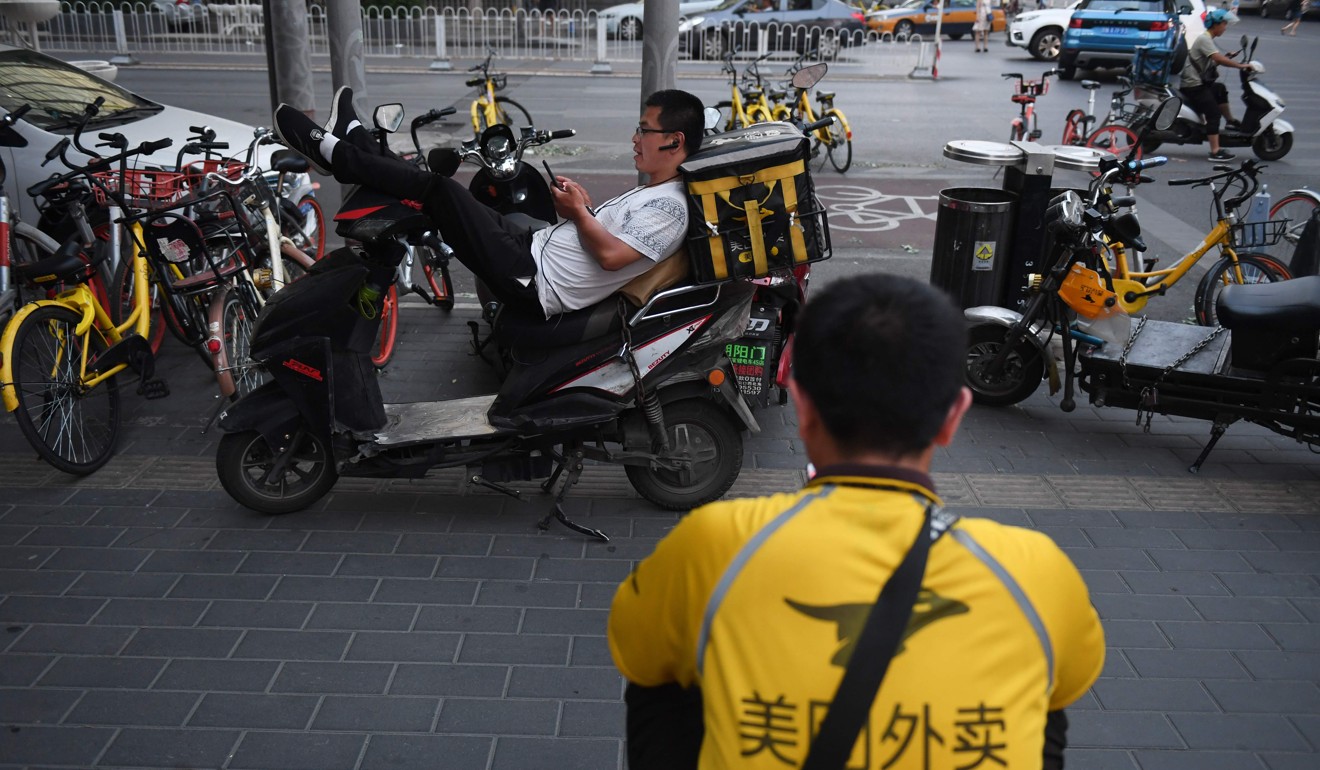
Exclusive | Didi’s financing plans may slow as it eyes IPO in 2019
Meituan-Dianping and Didi Chuxing are two of China’s most valuable unicorns and both are eyeing Hong Kong initial public offerings
Didi Chuxing, China’s ride hailing giant, may be slowing down its plan to raise funds and could be considering an IPO in the second half of next year partly because the need for fresh financing has been less pressing, according to people familiar with the situation.
Earlier this year, Didi was actively seeking to raise fresh capital by issuing US dollar convertible bonds, a type of debt security that can be converted into stock, but Didi is now slowing down its fundraising moves partly because competitor Meituan Dianping has also been easing back on the expansion of its ride hailing business, said the people familiar, who declined to be identified because the information is private.
Financing plans are fluid though and can change on market conditions, the people familiar said. A Didi spokeswoman declined to comment.
Meituan Dianping, China’s largest provider of on-demand online services, and Didi Chuxing are two of China’s most valuable unicorns, with valuations of US$30 billion and US$56 billion respectively based on their latest venture capital fundraising rounds last year. Last month, Meituan filed an application for an IPO in Hong Kong.
Meituan and Didi did not start out as direct rivals. In 2010, Meituan was founded by serial entrepreneur Wang Xing as China’s answer to Groupon, the US discount e-commerce player, while in 2012, Didi was established by former Alibaba employee Cheng Wei as China’s answer to Uber, the US ride hailing giant. Before 2016, Meituan and Didi were barely competitors.
Between 2012 and 2016, Didi got busy strengthening its presence in the cash-burning ride hailing business in China, which saw it acquiring rivals Kuaidi and Uber China. Didi became the dominant ride-hailing giant in China, and handled more than seven billion rides last year.
During that time, Meituan was gradually expanding into various businesses including food delivery, dining, local listings and online travel. Meituan fully acquired Dianping in 2017, which was previously a local listing and restaurant review firm.

In Meituan’s recent filing to the Hong Kong stock exchange, Meituan’s founding members, Wang Xing, Mu Rongjun and Wang Huiwen, together hold dominant voting rights over 59 per cent of Meituan Dianping.
Only at the end of 2016, when Wang Xing personally participated in the series C financing for China’s bike sharing firm Mobike for an undisclosed amount, did Meituan and Didi begin to square off in the mobility sector. Months before Wang’s interest in Mobike, Didi poured tens of millions of dollars into Ofo, Mobike’s major rival in China’s hot dockless bike sharing sector.
Last February, Meituan started to touch upon the ride hailing business by initiating trials in Nanjing. This March, Meituan announced it was entering the ride hailing sector in Shanghai. Meituan said it gained 30 per cent of the ride hailing market with a peak of 300,000 daily orders in Shanghai within its first three day of operations. Numbers were helped by heavy subsidies to both ride hailers and drivers. The price to take a ride with Meituan can be no more than 5 yuan (US$0.75), while it should be at least 14 yuan (US$2) with a taxi.
Meituan declined to comment on how much cash it set aside for ride subsidies in Shanghai and Nanjing. A Meituan spokesman said: “Local transportation is a component of our daily-life service offerings to consumers. Through our pilot programs, we are evaluating the synergistic value car-hailing services could bring to our platform, including higher user stickiness and shared location-based service technologies, such as maps and dynamic matching.”
Some of Meituan’s potential IPO investors have a different way of thinking though. “Meituan relies heavily on subsidies to maintain and get more market share for their ride hailing, food delivery, online travel agency and other sprawling businesses,” said Alex Au, managing director of Alphalex Capital Management, a Hong Kong-based hedge fund.
“If new competition emerges, Meituan will need to burn more money to keep market share. How many sticky users they can maintain remains a question no one can answer,” said Au.
Meituan’s other major move to bolster its transport business was the full acquisition of Mobike, the Beijing-based bike sharing unicorn, for US$2.7 billion in April this year. Didi meanwhile, took over the operations of smaller bike sharing company Bluegogo at the end of last year.
Meituan hasn’t expanded its ride hailing business further into any other major Chinese cities. “One of the resistance points Meituan might face is from transport regulators, especially for operating licences,” said Xue Yu, analyst at research firm IDC.
In April this year, Didi answered back by starting a food delivery business — a market where Meituan and Alibaba-owned Ele.me have dominated. IDC’s Xue described this as a “defensive move” from Didi. Didi said its food delivery platform received 334,000 orders on its launch day in Wuxi, southern Jiangsu province in China.
Didi’s food delivery business now operates in four cities – Wuxi, Nanjing, Taizhou and Chengdu, again using heavy subsidies to reduce the price of a typical order to as low as two yuan (US$0.3).
“It’s always better for customers when there’s a new player entering the food delivery business. And Didi’s entry will provide more of a counterbalance to the industry,” said Xie Pu, a Changsha-based technology columnist.
Both Didi and Meituan have been loss-making. In Meituan’s prospectus, the company reported an adjusted net loss of 2.85 billion yuan last year, 5.35 billion yuan in 2016 and 5.91 billion yuan in 2015.
Although Meituan’s net loss has narrowed in recent years, the Hong Kong market may not quite be ready to welcome loss-making companies in the same way that the US market does.
“Hong Kong investors believe more in the bottom lines of companies,” Alphalex Management Capital’s Au said.
With Didi’s IPO still some way in the distance it might be too early for investors to gauge valuation and size, but one thing is sure – it will receive the same careful examination as Hong Kong’s canny IPO investors are giving Meituan right now.
Alibaba is the parent company of the South China Morning Post.

